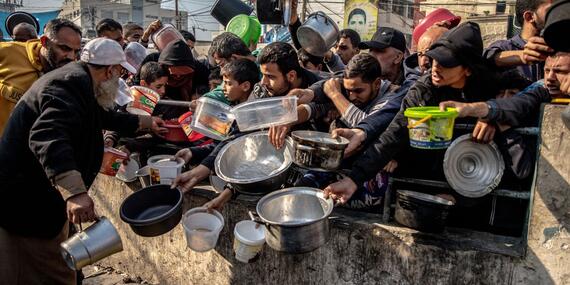Today's top news: Occupied Palestinian Territory, South Sudan

Occupied Palestinian Territory
The Under-Secretary-General for Humanitarian Affairs, Martin Griffiths, said in a social media post yesterday that the announcement about the risk of famine in Gaza by the Integrated Food Security Phase Classification (IPC) global partnership is sobering but not surprising. “We have been warning for weeks that, with such deprivation and destruction, each day that goes by will only bring more hunger, disease and despair to the people of Gaza,” he said.
Bombardment, ground operations and the besiegement of the entire population, coupled with restricted humanitarian access, have resulted in catastrophic levels of acute food insecurity, intensifying the risk of famine each day, according to the IPC.
Last night, the main telecommunication provider in Gaza announced that its services were gradually returning to the southern and central Gaza.
The United Nations is working with all involved to ensure that the flow of goods into Gaza is sufficient, predictable, swiftly delivered and based on what people need most. While the current scale of supplies entering Gaza falls short of what is required, what is equally crucial is reestablishing conditions within Gaza that allow for meaningful, efficient and large-scale humanitarian operations. Currently, intense fighting, the lack of electricity, limited fuel and disrupted telecommunications severely restrict access to loading points and trucks, as well as the ability to deliver, prioritize, plan and coordinate critical operations – with civilians bearing the brunt.
South Sudan
There has been a surge in new arrivals at South Sudan’s border with Sudan.
This comes as the war in Sudan spreads to the south and east of the country, amid fierce fighting in Wad Medani over the past week.
In recent days, the number of people arriving in South Sudan via the Joda crossing point has almost tripled – with a daily average of 1,000 people crossing last week, compared to nearly 3,000 yesterday.
Meanwhile, more than 6,000 people are reportedly still waiting on the Sudanese side of the border to cross, with thousands more people expected to join that queue in the coming days.
We and our humanitarian partners continue to scale up support for new arrivals in South Sudan at the Renk Transit Centre, where more than 23,000 people are being hosted despite crowded conditions.
Across the country, some 4.6 million people have received some form of humanitarian assistance and protection services this year, as of September.
This is despite funding shortfalls, as well as ongoing violence and threats against humanitarian personnel and assets.
For 2024, the humanitarian community in South Sudan is appealing for $1.8 billion to assist 6 million people. To do so, timely and sufficient funding for the response will be critical.
